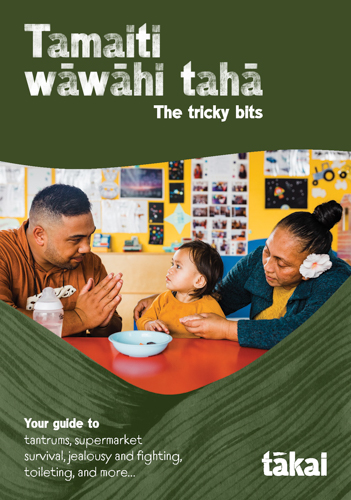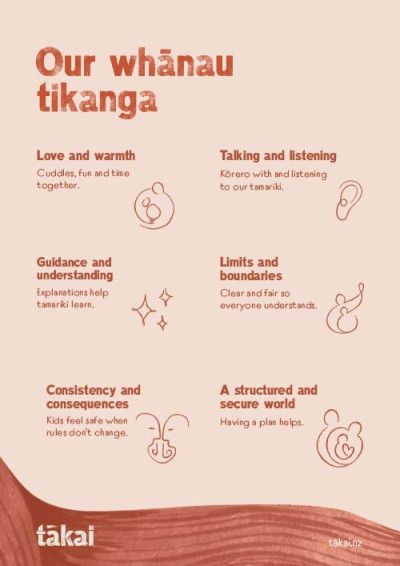
Some of the tricky bits
Guiding children's behaviour is tricky, but there are things whānau can do to manage behaviour, such as explaining reasons and talking about solutions.
Here are some ideas for starting a conversation about the issues outlined in the Tākai booklet The Tricky Bits. These issues include toileting, supermarket survival, tantrums, jealousy and fighting.
Pātai ki te whānau:
- Do you parent your tamariki in the same way you were parented?
- What are your personal beliefs about children’s behaviour?
- What are your partner’s beliefs?
- What are some of the important things you’ve learned from being a parent?
Understanding kids’ behaviours:
- Which of your child’s behaviours do you manage well?
- Why do you think that is?
- What might you need more help with or would like to change?
Ngā tohu whānau
Take a Ngā Tohu Whānau (Six things children need) poster for whānau – or they might have one already. Revisit each tohu if you think it might be helpful.
Most of the time, guiding children’s behaviour or helping them to learn whānau rules is a matter of practice.
Ask whānau to think about a time when they’ve had to learn something new. Do we usually get it right first pop?
Remind whānau – practice makes progress.
Suggest they keep the ‘6 things’ in mind, no matter how old the tamaiti is, and try to stay calm when they’re guiding their tamaiti.
Invite them to look through The Tricky Bits booklet with you and see if there are any messages in there they can relate to.
Some management tips for whānau
Discuss the following ideas with whānau:
- Explain reasons – for example, when explaining why you want them to wear shoes outside: 'I think you should wear your shoes in case the stones hurt your feet.’
- State the problem and encourage them to find solutions. How might you talk to 2 children who are scrapping over a toy truck? For example, ‘There’s only one truck and you both want it. What can we do?’
- Prepare children in advance. Ask if the caregiver can think of an example, such as, ‘Five more minutes and then it’s tea time.’
- Focus on the positive: ‘I love seeing you being gentle with the kitten, and he likes it too.’
Guiding, rather than punishing, maintains a child’s mana – and the adult’s too.
Tamariki will not remember rules the first time they hear them. Be patient and gently remind them again.
Mistakes can be seen as learning opportunities for both children and adults.
- Can you think of a time when that happened?
 pdf 9.3 MB
pdf 9.3 MB












